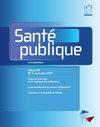Cadre d’action de promotion de la santé reproductive : analyse critique lexicométrique et trans des politiques publiques françaises contemporaines
IF 0.3
4区 医学
Q4 PUBLIC, ENVIRONMENTAL & OCCUPATIONAL HEALTH
引用次数: 0
Abstract
INTRODUCTION In France, since 2017 the law has allowed people to change the gender marker on their civil status documents without having undergone medical treatment and sterilization surgery. However, no legislative framework has been provided to ensure their right to family, leaving those who wish to become parents in a space of social, political, and legal uncertainty that is inconsistent with international and human rights. In parallel, France has developed an arsenal of health strategies that constrain actors working in the field. PURPOSE OF THE RESEARCH This study examines the possibilities available to public health actors for promoting reproductive health in the absence of legislation and in the context of political and legislative adversity. To this end, it relies on a participatory, critical, and lexicometric analysis of national strategies for sexual and reproductive health and parenthood support. RESULTS Governance strategies make no mention of parentality among transgender people. Sexual and reproductive health policies focus on tackling sexually transmitted infections, on health pathways, and on violence and discrimination. The analysis also highlights a lack of awareness on this topic. CONCLUSIONS Shortcomings in the legislative framework and public health strategies raise ethical questions about the promotion of reproductive health and the potentially non-inclusive approach of actors in the field. These issues force communities to carry out actions outside the scope of ordinary regulations, and they highlight the political positioning of the public-health field in France.促进生殖健康的行动框架:对法国当代公共政策的关键词汇和反式分析
导言在法国,自 2017 年起,法律允许人们在未接受医疗和绝育手术的情况下更改公民身份证件上的性别标记。然而,没有任何法律框架来确保他们的家庭权,使那些希望成为父母的人处于社会、政治和法律的不确定空间,这不符合国际人权。与此同时,法国还制定了一系列卫生策略,限制了在这一领域开展工作的人员。本研究的目的是探讨在没有立法的情况下,在政治和立法不利的背景下,公共卫生人员促进生殖健康的可能性。为此,本研究采用参与式、批判性和词汇计量学的方法,对性健康和生殖健康以及支持为人父母的国家战略进行了分析。性健康和生殖健康政策的重点是应对性传播感染、健康途径以及暴力和歧视。结论立法框架和公共卫生战略中的缺陷引发了有关促进生殖健康的伦理问题,以及该领域行动者可能采取的非包容性方法。这些问题迫使各社区采取普通法规范围之外的行动,突出了法国公共卫生领域的政治定位。
本文章由计算机程序翻译,如有差异,请以英文原文为准。
求助全文
约1分钟内获得全文
求助全文
来源期刊

Sante Publique
PUBLIC, ENVIRONMENTAL & OCCUPATIONAL HEALTH-
CiteScore
0.40
自引率
33.30%
发文量
252
审稿时长
>12 weeks
期刊介绍:
La revue Santé Publique s’adresse à l’ensemble des acteurs de santé publique qu’ils soient décideurs,
professionnels de santé, acteurs de terrain, chercheurs, enseignants ou formateurs, etc. Elle publie
des travaux de recherche, des évaluations, des analyses d’action, des réflexions sur des interventions
de santé, des opinions, relevant des champs de la santé publique et de l’analyse des services de
soins, des sciences sociales et de l’action sociale.
Santé publique est une revue à comité de lecture, multidisciplinaire et généraliste, qui publie sur
l’ensemble des thèmes de la santé publique parmi lesquels : accès et recours aux soins, déterminants
et inégalités sociales de santé, prévention, éducation pour la santé, promotion de la santé,
organisation des soins, environnement, formation des professionnels de santé, nutrition, politiques
de santé, pratiques professionnelles, qualité des soins, gestion des risques sanitaires, représentation
et santé perçue, santé scolaire, santé et travail, systèmes de santé, systèmes d’information, veille
sanitaire, déterminants de la consommation de soins, organisation et économie des différents
secteurs de production de soins (hôpital, médicament, etc.), évaluation médico-économique
d’activités de soins ou de prévention et de programmes de santé, planification des ressources,
politiques de régulation et de financement, etc
 求助内容:
求助内容: 应助结果提醒方式:
应助结果提醒方式:


